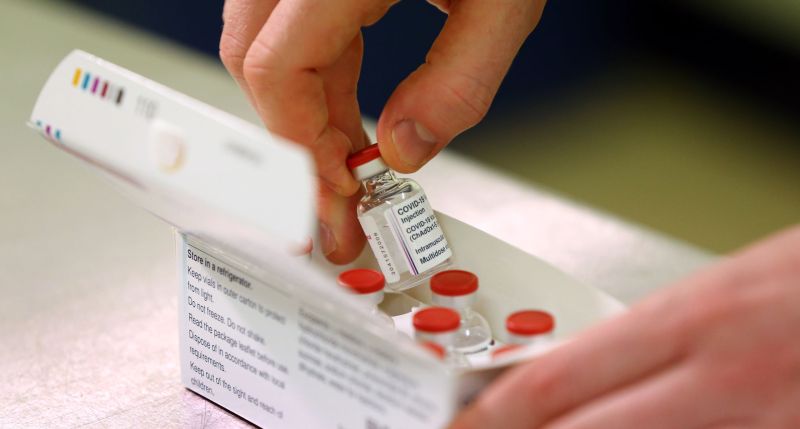
The rollout of the Pfizer/BioNTech and Moderna Covid-19 vaccines in the US is not proceeding smoothly, which is not surprising given the logistical challenges of administering a novel vaccine that requires two doses. There are similar problems in the UK, where the Pfizer/BioNTech and Oxford University/AstraZeneca vaccines are now authorized, the latter gaining authorization just last week.
Accordingly, the British government, without public discussion and in an opaque manner, is varying the protocols for vaccine administration. The second dose of both vaccines can now be given up to 12 weeks after the first dose. And it even is permitting that different vaccines can be used for the first and second doses in some situations. Both of these protocol changes have little or no support in clinical trial data.
The goal of these, frankly, large-scale human experiments is to increase the number of people given their first dose and thereby partially protected. Similar proposals about delaying the second dose have been discussed in the US, though on Monday, top officials from the US Food and Drug Administration said in a statement that the FDA does not support changing the vaccine administration protocol initially set forth, based on a lack of evidence that the vaccine would still be sufficiently effective with an altered administration plan. Pfizer, for its part, has said that the trial data do not support that the first dose alone is effective beyond 21 days after injection.
In the US, whatever public confidence has been gained in Covid-19 vaccines is largely rooted in the thorough and transparent evaluation process that allows anyone to attend FDA and US Centers for Disease Control and Prevention advisory panel meetings, inspect the data and raise questions.
Hence scientists and physicians can understand what is being evaluated and are able to recommend the vaccines to friends, family and the wider public. The authorization procedures in the UK are far less transparent. So when significant deviations from the recommended use of the approved vaccines are applied, how can the public trust the right decisions were made? How can knowledgeable independent healthcare professionals endorse those decisions when they are not privy to the process?
Making matters all the more concerning, the UK clinical trials of the Oxford/AstraZeneca vaccine were confusing and problematic. It's difficult to understand the basis of various conclusions drawn in the UK about the efficacy of this particular vaccine under various dosing conditions. Perhaps for that reason, the FDA is presumably waiting for an American efficacy trial to be completed before deciding on the approval of this vaccine.
The Pfizer vaccine data, on the other hand, is very solid, but it appears to be badly misinterpreted in the UK. The FDA briefing document specifically states in its efficacy summary of the vaccine that the available data "cannot support a conclusion on the efficacy of a single dose of the vaccine". However, UK authorities say the plan to delay a second dose of the vaccines is based in part on efficacy data, citing calculations that estimate a single dose of the Pfizer vaccine to have a 90% short term efficacy, and a single dose of the Oxford vaccine to have a 70% short term efficacy.
This conclusion seems, at best, highly dubious. The Pfizer data set does not tell us for how long any benefit of a single dose might persist. Antibodies to the Covid-19 vaccines diminish over time. It is not known when this decay might compromise efficacy, but it seems questionable, based on the data laid out in the FDA briefing document, to believe that antibody levels will be protective for up to 12 weeks.
Beyond the greater risks to individuals, there could be wider consequences to a prolonged dosing interval. Would confidence in the vaccine be reduced by multiple reports of vaccine failures among at-risk individuals? Would some recipients of a single dose feel protected and increase their behavioral risk? Weak antibody responses in large populations of inadequately immunized people could drive the emergence of vaccine-resistant or otherwise problematic virus variants with very serious consequences.
Nonetheless, the UK is persisting with policies that the FDA has now clearly stated will not be applied in the US. I agree with the FDA's judgment. Perhaps the UK could consider instead other ways to conserve vaccine supplies that may be safer than the delayed second dose option. It is worth exploring whether giving two half-doses of the Pfizer vaccine would provide sufficiently strong antibody levels, which is suggested by some of Moderna's and Pfizer's clinical trial data. The FDA has noted its concern over this dosage change, too, in the absence of convincing evidence that it would be effective, but it may, at least, be a safer resource-saving measure than delaying a second vaccine dose if the UK is determined to double its vaccinated population in the short term.
Also, for people who have recovered from Covid-19 a single vaccine dose may indeed be sufficient to boost their antibodies to high levels. The dose-saving could be considerable, as over 2.6 million Britons have been infected. Even these suggestions carry risks and perhaps should be further studied and applied only for younger people.
Any deviation from FDA-approved protocols should not be taken lightly. But if changes are deemed necessary, the UK should seek the least-bad ones, and only after a full and transparent discussion of what is involved. That is the American model, but unfortunately one that is not being followed in the UK.
John P. Moore is a professor of microbiology and immunology involved in vaccine research at Weill Cornell Medicine in New York City. The opinions expressed in this commentary are his own.
